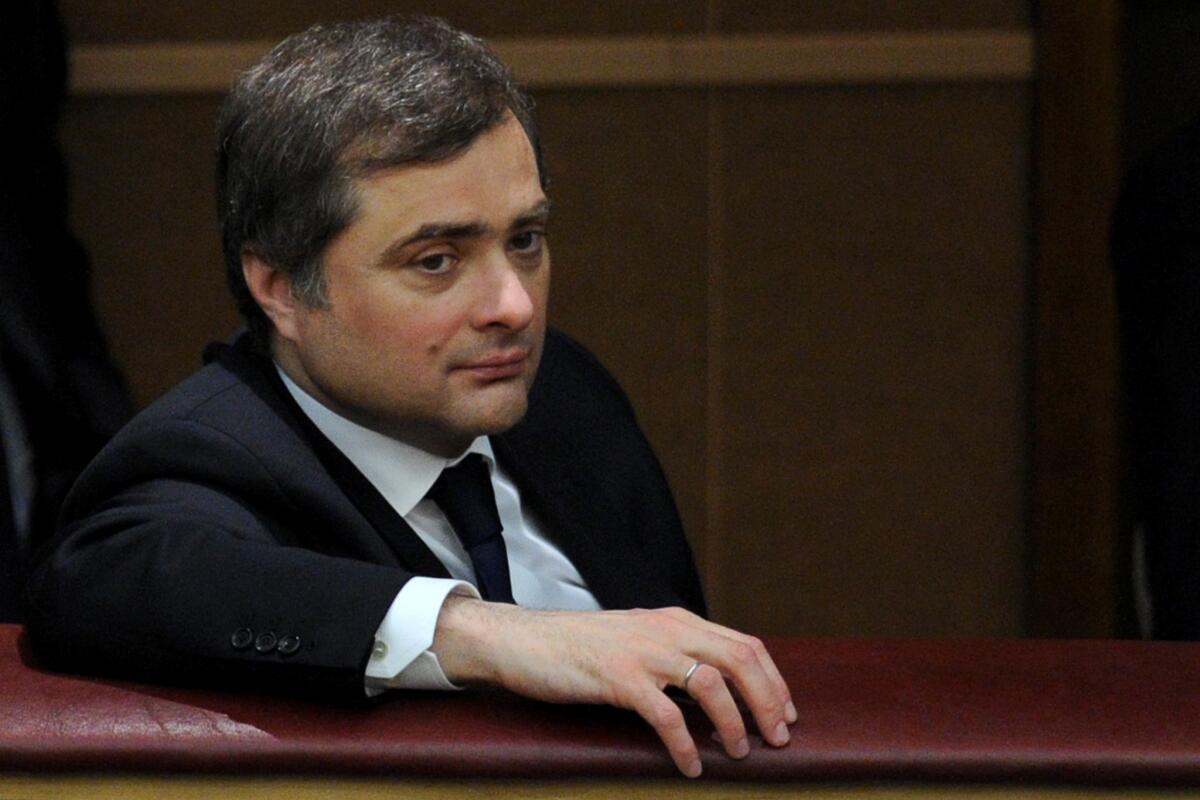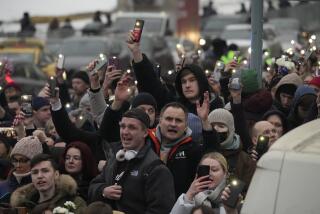Russian Deputy Premier Vladislav Surkov relieved of duties

MOSCOW — Vladislav Surkov, a masterful political operative and propagandist known as the “gray cardinal” of the Kremlin, was fired Wednesday in a move that was widely seen as a reflection of a deepening rift in the relationship between President Vladimir Putin and Prime Minister Dmitry Medvedev.
The decree signed by Putin said that Surkov was being relieved of his duties at his own request. Most Russian political experts, however, agreed that the 48-year-old deputy premier was the victim of larger political forces, although “victim” seems an unlikely term to describe a man who has drawn comparison to Machiavelli and Rasputin.
“The bottom line is that the Kremlin no longer needs to rely on ideologues and propagandists,” said Andrei Piontkovsky, a prominent political analyst. “Putin needs butchers, not image makers anymore.”
Surkov’s ouster dominated radio and TV news and social media and was seen as a message to Medvedev.
“Sometime soon,” Piontkovsky predicted, “Medvedev will be dumped too — but not yet.”
Born to a Russian mother and a Chechen father, Surkov started his career as a bodyguard and then business associate of Mikhail Khodorkovsky, the oil magnate who became Russia’s richest man and a potential rival of Putin before being arrested and jailed by the Kremlin in 2003.
By then, Surkov was on the other side, having become deputy head of the Kremlin’s staff in 1999, the year Putin ascended to power. Operating largely behind the scenes, Surkov played what many considered to be a leading role in shaping and promoting the new post-Soviet authoritarian regime.
Surkov introduced the unlikely concept of “sovereign democracy,” one that is strictly monitored and controlled from the top and closed to meddling from abroad.
His signature strategy was to co-opt, rather than confront. So to avoid an “orange infection” of youth (a reference to Ukraine’s Orange Revolution), he created pro-Putin youth groups such as Nashi (“Ours”) and Young Guard, which had enough of an edge to attract restless young people from the provinces. He was said to be the mastermind behind the creation of the pro-Kremlin United Russia political party and to have ensured its dominance in elections and in parliament.
He also was believed to have played a key role in turning state television into a powerful propaganda machine designed to promote Putin’s image as a brave, just, wise and strong leader.
Surkov cultivated a softer image as well. He made little secret of his love for composing music and writing poetry and rock lyrics. In 2009, he is believed to have written a novel, “Around Zero,” under the pen name Natan Dubovitsky.
It isn’t clear what caused Putin to cool toward Surkov. The Kremlin aide became deputy prime minister in December 2011, months before Medvedev traded places with Putin, who returned to the presidency.
Surkov came under fire this year when federal investigators began looking into an alleged $750,000 fraud associated with Medvedev’s brainchild, the Skolkovo international business school, intended to create a Russian Silicon Valley. Surkov was in charge of monitoring it.
During a meeting at the London School of Economics last weekend, Surkov denounced Russian law enforcement for what he called unjustified attacks on Skolkovo.
Investigative Committee spokesman Vladimir Markin responded Tuesday in the newspaper Izvestia, suggesting that Surkov be fired for criticizing Russia on foreign soil. “How long would a member of [the British] Cabinet stay in his job if, during a private visit to Moscow, he publicly denounced Scotland Yard?” he asked.
Kremlin spokesman Dmitry Peskov insisted Wednesday that Surkov’s firing had nothing to do with the Skolkovo scandal or the exchange with Markin. He said the dismissal was related to Putin’s criticism of the government’s lack of zeal in carrying out presidential orders.
“It can be said with absolute confidence that, given such talent and such work experience, Surkov will be in demand in many places, without doubt,” Peskov said.
Some commentators suggested that those places would be outside Russia.
“I don’t know of his plans, but I think he should be planning political emigration now,” said Ilya Yashin, an opposition leader, in a phone interview with The Times. Not that he’s sympathetic.
“Surkov,” he said, “is personally responsible for creating this repressive machine … for closing down political parties, for purging and subjugating the … mass media, for manipulating elections and for fabricating criminal cases against opposition activists.”
ALSO:
Ship crash in Italy kills at least seven
Israeli police question a top Palestinian cleric
Authorities arrest 31 in spectacular diamond heist
More to Read
Start your day right
Sign up for Essential California for news, features and recommendations from the L.A. Times and beyond in your inbox six days a week.
You may occasionally receive promotional content from the Los Angeles Times.






